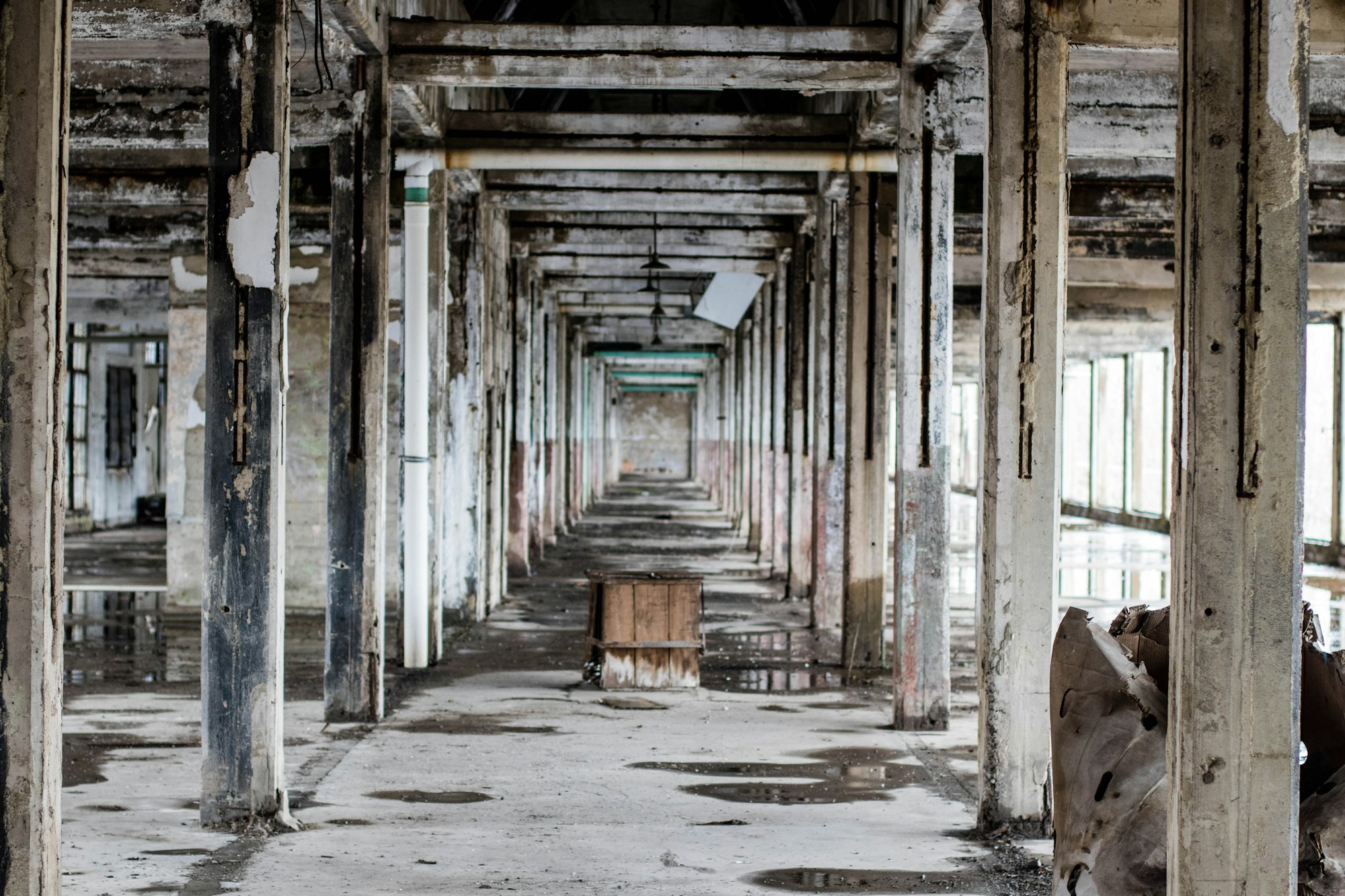Experiencing Death
What does it feel like to die?

I suppose most of my articles are quite dark, but this one especially so. If you've lost someone and don't wish to imagine what they went through you may want to skip this article.
The natural conclusion to collapse is death. The death of the environment, civilization, social norms, plants, animals and humans. This is the end result of our quest for indefinite growth, but rarely are the details discussed.
I do not wish to glorify death. Instead, by detailing the excruciating process, I hope to give the word greater meaning, forcing people to consider the consequences of their actions or at least appreciate their health.
Those who have never witnessed death only have media as a frame of reference, where it is usually portrayed as quick and conclusive. One moment someone is alive and the next they're dead. In some cases, there may be an implied dismantling of life - such as a character fighting cancer - but the suffering is muted and expedited for the sake of entertainment.
The masked reality is quite different.
Anyone who has witnessed death knows it is often messy, agonizing and frightening, dragging out for longer than you might expect. Personally, I've witnessed or managed three deaths. I consider myself lucky in that regard. (I realize this number only has one way to go.)
The details of the first incident are fuzzy, as I was simply a witness. I have a vivid memory of someone lying on the ground choking on the blood flowing from their innards out their mouth. If I didn't look away I would have thrown up. The bubbling sound of his desperate gasps for air through a mouthful of blood was inescapable. This lasted for a few minutes. That is a long time to fight for your breath.
The next two deaths were of my pets. My last dog had to be euthanized as her degenerative myelopathy had worsened for months. At home she was calm and seemed 'ready'. We took her to the vet and everything changed. I will never forget my dog's emotional reaction. Her jaw shuddered uncontrollably in fear as we sat with her on the ground. I did my best to comfort her but she was so scared. It was the first time in almost 15 years of life this 78lb German Shepherd was anything but content, curious or courageous.
My cat was euthanized several months after my dog. He was 18 and had also deteriorated considerably. We thought he still had time, but one day his body broke. Over the next 24 hours he had roughly 20 seizures - his body contorting wildly each time. By the time we got to the vet, his end was a relief. He was spent.
Given these experiences, I will never push life beyond its limits, ensure death occurs in a comfortable environment and stock calming medications to help with the process. Not knowing what to expect, I mismanaged the process. I wish I didn't put my dog and cat through that experience.
Perhaps my most important lesson was that death is not an event. It is a process. Often, it is a painful, frightening process that ends with a welcome release.
Reflecting on these experiences, I wonder how I will die. My hope is I wind down in a comfortable hospice, painlessly and without fear. After seeing what happened to my dog and cat there's a good chance that's wishful thinking. This is especially true, as we approach a time when the resources to support death dwindle.
The healthcare industry could barely handle the Covid-19 pandemic. Can it handle the multi-front destruction of infrastructure coupled with disasters and mob violence? Many of us will be on our own.
While it is the climax of collapse, death is paradoxically an afterthought.
The planet is heating...yada, yada, yada...and then mass extinction.
It is a key element of the collapse equation, yet the reality of what this conclusion means - to an individual with senses, emotions, thoughts - is rarely illuminated. Perhaps if we shared the gory details people would see through the abstraction and do more to avoid it.
How will I die?
In a previous post, I mapped the collapse timeline. Regardless of exact timing, the analysis forecasts billions of deaths over the course of this century. However, this estimate glosses over the individual experience as if they were numbers on a spreadsheet.

I want to know what death means for me when my time comes. I expect it will be unmanaged and unplanned. That means I'll experience the full unforgiving brunt of death.
In a collapsing world, there are plenty of ways to die: heat, starvation, dehydration, drowning, malaria, fire, poor sanitation, violence and untreated conditions. Sadly, many of these are already repeated occurrences in some regions.
The dying process
Below I attempt to describe the biological dying process for a variety of causes, and what the individual actually feels.
Heat
The experience begins with fatigue, intense thirst, and profuse sweating as the body struggles to regulate its temperature. Over time, sweating may stop as the body depletes its fluid reserves, and the skin becomes hot, dry and flushed. The core temperature rises above 40°C (104°F), leading to confusion, dizziness, and disorientation as the brain struggles to function without proper cooling. Blood vessels dilate in an attempt to release heat, causing a drop in blood pressure and reduced blood flow to vital organs. Nausea, vomiting and muscle cramps set in as the body’s enzymes start to denature and normal cellular processes fail. The person may experience seizures or hallucinations as the heat overwhelms their brain. Eventually, organ systems fail, leading to unconsciousness and death from multi-organ failure and irreversible brain damage.
Starvation
Starvation begins with hunger, fatigue, and lightheadedness as the body uses stored glycogen for energy. Over days and weeks, glycogen reserves are depleted, and the body starts breaking down fat and muscle tissue to sustain vital functions. This leads to extreme weakness, rapid weight loss and muscle atrophy. The skin becomes thin and dry, and the immune system weakens, making the body prone to infections. Protein deficiency can cause swelling in the abdomen (edema), and vital organs, including the heart, begin to shrink. Electrolyte imbalances lead to muscle cramps and irregular heart rhythms. By the final stages, cardiac atrophy and low blood pressure result in decreased oxygen delivery to the brain, causing confusion and lethargy. Death occurs due to cardiac arrhythmia or multi-organ failure.
Dehydration
Dehydration starts with intense thirst, dry mouth, and fatigue as the body loses water faster than it can be replenished. Blood volume decreases, causing a drop in blood pressure and making the heart work harder to circulate oxygen and nutrients. As dehydration progresses, the skin becomes dry and less elastic, the eyes sink into their sockets, and the tongue swells, often cracking painfully. The kidneys begin to fail, and urea builds up in the bloodstream, causing nausea, confusion and disorientation. Severe electrolyte imbalances lead to painful muscle cramps and irregular heart rhythms. In the final stages, blood flow to the brain decreases, resulting in hallucinations, fainting and eventual loss of consciousness. Death occurs due to hypovolemic shock, where the heart can no longer pump blood effectively.
Drowning
The process begins with cold water shock, where sudden immersion causes involuntary gasping, rapid breathing, and a spike in heart rate and blood pressure. As the person struggles in the water, they inhale a mixture of air and water, leading to choking and coughing. Water enters the lungs, interfering with oxygen exchange and causing an intense burning sensation. The brain becomes starved of oxygen (hypoxia), leading to panic, confusion and loss of coordination. As carbon dioxide builds up in the blood, the body experiences laryngospasm, where the vocal cords seal shut to prevent further water intake. This results in a feeling of suffocation, even though the lungs are flooded. Unconsciousness occurs within minutes, followed by cardiac arrest and brain death.
Malaria
After being bitten by an infected mosquito, symptoms begin within a week. Fever, chills and a severe headache mark the early stages as the parasite multiplies in red blood cells. Over time, cerebral malaria sets in, where capillaries in the brain become clogged with infected cells, cutting off oxygen supply. The person experiences seizures, delirium and intense sweating as their body struggles to fight the infection. Nausea, vomiting and body aches add to the torment. As red blood cells rupture, toxins flood the bloodstream, causing systemic inflammation, organ damage, and disseminated intravascular coagulation (DIC), where clotting and bleeding occur simultaneously. Death occurs after several days due to brain swelling, multi-organ failure and sepsis.
Fire
Exposure to a wildfire begins with difficulty breathing due to inhalation of hot air, smoke and particulate matter. The smoke irritates the airways, causing coughing and a burning sensation in the throat and chest. Carbon monoxide in the smoke replaces oxygen in the blood, leading to hypoxia, which causes dizziness, confusion and fainting. Simultaneously, radiant heat from the fire burns the skin, even without direct contact, causing blistering and severe pain. As the fire consumes available oxygen, the person struggles to breathe. In the final moments, unconsciousness sets in due to carbon monoxide poisoning and oxygen deprivation. Death follows from asphyxiation or thermal injury.
Poor sanitation
Living in overcrowded, unsanitary conditions due to displacement leads to rapid spread of diseases like cholera. Symptoms begin with severe diarrhea and vomiting, causing rapid fluid loss and dehydration. As the body loses electrolytes like sodium and potassium, muscle cramps and irregular heart rhythms develop. Weakness sets in as the kidneys fail to excrete waste, leading to uremia and metabolic acidosis. The brain swells due to sodium imbalances, causing seizures, confusion and eventual coma. Death occurs from hypovolemic shock and cardiac arrest, typically within days of the onset of severe symptoms.
Gunshot or stab wound
A gunshot wound to the chest causes immediate trauma to the lungs and major blood vessels. The collapse of a lung leads to difficulty breathing, while blood pooling in the chest cavity reduces oxygen delivery to vital organs. The person experiences intense pain and a feeling of suffocation as blood flow to the brain diminishes. Shock sets in as blood pressure drops, causing confusion and cold extremities. Death occurs within minutes due to massive blood loss and respiratory failure.
Untreated diabetes
Without access to medical care, untreated diabetes leads to diabetic ketoacidosis (DKA). The person feels intense fatigue, nausea and abdominal pain as their blood becomes acidic. Deep, labored breathing develops as the body tries to expel carbon dioxide and counteract the acidosis. Electrolyte imbalances lead to muscle weakness and irregular heart rhythms. Eventually, confusion and unconsciousness set in due to brain swelling. Death occurs from cardiac arrest caused by severe potassium imbalances.
Untreated wounds
An untreated wound becomes infected, leading to sepsis as bacteria spread through the bloodstream. Symptoms begin with fever, chills, and rapid heart rate. As the infection progresses, systemic inflammation causes blood vessel leakage, leading to swelling, low blood pressure, and reduced oxygen delivery to tissues. Organs begin to fail sequentially, with the kidneys, liver and lungs affected first. The person experiences confusion and shortness of breath as their oxygen levels drop. In the final stages, septic shock causes a rapid decline in blood pressure, unconsciousness and death due to multi-organ failure.
The commonality of unmanaged death:
- Pain
- Confusion
- The sensation of suffocation
- Muscle cramps
- Seizures
Multiply this experience across billions of lives lost over the next few decades.

This article isn't about providing answers or recommendations. Rather, it fulfills a morbid curiosity and draws a closer connection to what we might experience at the end. Perhaps it motivates a few to become more conscious about the threats ahead. Many collapse-aware have already formulated their own exit strategy to avoid such an ugly fate.
If nothing else, hopefully a transparent understanding of the suffering to come forces us to appreciate the time and health we have today.





